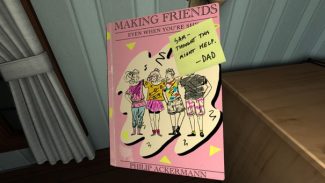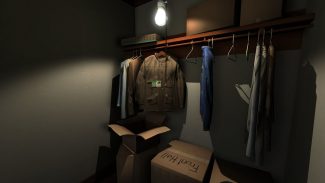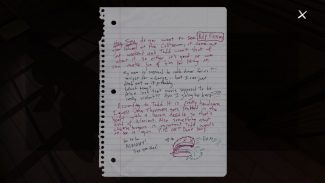Bastion
LQ: 9.15
Recommended Age: 10+
Skills Used: Planning, Working Memory, Mathematics, Reading
GoneHomeGame.com / PlayStation / Xbox / Steam
Gone Home is a first-person exploration game for a more mature audience. Kids 13 years and older are likely ready for subject matter written around issues of social acceptance, self-image, and personal and familial relationships. Players take on the role of Kaitlin, a 21-year-old woman returning to her family home in mid-90s Oregon. The travel-weary protagonist has been overseas, but embarks on a journey of a different sort as she becomes a tourist in her own home, exploring the rooms deserted by her family to uncover the circumstances of their strange disappearance. You’ll rifle through the belongings of Kaitlin’s 18-year-old sister, Samantha, who is in love with a girl she met at school, and the sisters’ parents, who have problems and secrets of their own — sadder and more horrifying than Kaitlin could ever have imagined. Winner of the 2013 BAFTA Video Game Award for the debut game with the best story, Gone Home is an exploration of humanity that contains themes of self- and social awareness — sharing, listening, empathy, reflection, depression, anxiety, resilience, and hope.
Getting started and then maintaining attention and effort to tasks.
 Focus is a major thinking skill used for a game like Gone Home that doesn't rely on the stereotypical video game flash. The quiet story is driven by point-and-click exploration (some call the genre a "walking simulator," but it's much more than that) and allows players to spend as much time as they want examining the artifacts of Kaitlin’s family home. By looking at and reading (itself an exercise in focus) everything closely, players gain insight into the hearts and minds of Kaitlin, her sister, and their parents as they work on their ultimate goal of learning where the family has gone.
Focus is a major thinking skill used for a game like Gone Home that doesn't rely on the stereotypical video game flash. The quiet story is driven by point-and-click exploration (some call the genre a "walking simulator," but it's much more than that) and allows players to spend as much time as they want examining the artifacts of Kaitlin’s family home. By looking at and reading (itself an exercise in focus) everything closely, players gain insight into the hearts and minds of Kaitlin, her sister, and their parents as they work on their ultimate goal of learning where the family has gone.
Understanding our own actions, thoughts and feelings and empathizing with others.
 Gone Home deals with issues that are very common for adolescents and young adults, as well as some more serious family issues. As Kaitlin digs deeper into her sister’s and parents’ notes and affects, it's impossible not to see past the familial relationships to the people they really are. Gone Home touches on themes of human relationships, identity, abuse, addiction, and social justice issues. Seeing your sibling, mom, or dad as a regular person with their own problems and preferences can be an eye-opening experience for a young person, one that leads to more social and critical thinking, and the development of social emotional learning skills like empathy.
Gone Home deals with issues that are very common for adolescents and young adults, as well as some more serious family issues. As Kaitlin digs deeper into her sister’s and parents’ notes and affects, it's impossible not to see past the familial relationships to the people they really are. Gone Home touches on themes of human relationships, identity, abuse, addiction, and social justice issues. Seeing your sibling, mom, or dad as a regular person with their own problems and preferences can be an eye-opening experience for a young person, one that leads to more social and critical thinking, and the development of social emotional learning skills like empathy.
Recalling and retaining information in our minds while working.
 Because the mysteries of Gone Home reveal themselves as players read through notes and examine personal items, working memory is called upon in a major way. Not only does all that reading by its very nature exercise working memory, but players use memory skills to establish a working knowledge of personal histories and events as they uncover them. Simply navigating the house and remembering where one has looked and what one has found is good working memory exercise. Players who take all this sleuthing seriously might also find it necessary to jot down notes as they move through the game, naturally arriving at a memory strategy that is easily translated to the real world.
Because the mysteries of Gone Home reveal themselves as players read through notes and examine personal items, working memory is called upon in a major way. Not only does all that reading by its very nature exercise working memory, but players use memory skills to establish a working knowledge of personal histories and events as they uncover them. Simply navigating the house and remembering where one has looked and what one has found is good working memory exercise. Players who take all this sleuthing seriously might also find it necessary to jot down notes as they move through the game, naturally arriving at a memory strategy that is easily translated to the real world.
 Though Gone Home is a game that requires a certain amount of reading comprehension skill, its story is so immersive that even a struggling reader will want to hang in there. Nearly everything a player finds out about Kaitlin’s family (and it's pretty intriguing stuff), they find out by reading -- and reading between the lines. And because all of this text is discovered as players snoop through a spooky deserted house, there's something very voyeuristic and tantalizing about it. Practice doesn't feel like work when it's exciting and fun.
Though Gone Home is a game that requires a certain amount of reading comprehension skill, its story is so immersive that even a struggling reader will want to hang in there. Nearly everything a player finds out about Kaitlin’s family (and it's pretty intriguing stuff), they find out by reading -- and reading between the lines. And because all of this text is discovered as players snoop through a spooky deserted house, there's something very voyeuristic and tantalizing about it. Practice doesn't feel like work when it's exciting and fun.
All membership plans come with full access to our entire suite of tools learning guides, and resources. Here are a few of the ones we think you’ll like the most: